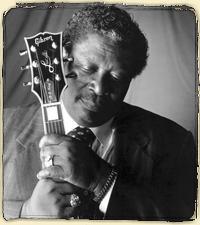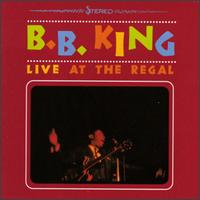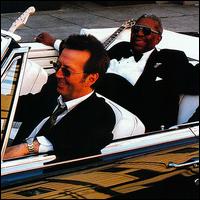

Courtesy of
B.B. King


A FIRESIDE
CHAT WITH B. B. KING
What is there to say about B.B. King that hasn't already been written
or said a hundred times over. Certainly I am not qualified nor presume
to have the authority to say or add anything more to what has already
been said and written. So rather than make an ass of myself, I will relinquish
the stage to Mr. King. As always, unedited and in his own words (it is
truly my honor).
FRED JUNG: Let's start from the beginning.
B. B. KING: Firstly, I wanted to be like my pastor in church and play
guitar. He played guitar in church, the first electric guitar I ever heard.
And I wanted to be a gospel singer and when I got in my teens, I used
to sit on the street corners and play and people would request songs.
When I would sing a gospel song, they would praise me highly and pat me
on the head and tell me to keep it up. "You're going to be great
one day." But they never put anything in the hat. People that would
ask me to sing and play the blues would always put something in the hat,
so that is what motivated the blues playing.
FJ: What a classic story to tell my grandkids, the legendary B. B. King
started playing the blues to fill the hat.
B. B. KING: (Laughing) Yes, and I decided that I would play more blues
because I got more tips. I wanted to be a gospel singer. That is the way
I wanted to go, but by having the tips from the people that requested
blues, that is what made my mind up.
FJ: Why do you name your guitars Lucille?
B. B. KING: It started in 1949. In '49, I used to play a place quite often
in Twist, Arkansas. Twist, Arkansas is about forty-five miles northwest
of Memphis, Tennessee. It used to get quite cold in the winter there,
so they used to take something like a big garbage pail and set it in the
middle of the dance floor and half fill it with kerosene, light the fuel
and that is what we used for heat in winter. People dancing would generally
dance around it and never disturb it. But one night, two guys started
to fighting and one knocked down one of them containers and it was already
burning with kerosene and so when it spilled onto the floor, it looked
like a river of fire and everybody started to run for the front door,
including B. B. King. But when I got on the outside, I realized then that
I had left my guitar on the inside. So I went back for it. The building
was a wooden building and burning rapidly. It started to collapse around
me and I almost lost my life trying to save my guitar. So the next morning,
we found out that these two guys that were fighting were fighting about
a lady that worked in the little dance hall. We learned that her name
was Lucille. So I named the guitar Lucille to remind me to never do a
thing like that again.
FJ: How many Lucilles have you played through the years?
B. B. KING: I'm playing Lucille XVI at this time.
FJ: Let's touch on your new collaboration with Eric Clapton, Riding with
the King.
B. B. KING: I admire him. We have been friends since the Sixties. When
I heard him say on Larry King that he would like to record with me, that
was one of the great things to my ears. So we got in touch after that
and he made it a reality. The man, in my opinion, is a genius. He is not
only a great man and a great musician, but he has real nice ideas. In
fact, the whole Riding with the King was his idea. I love the guy. I mean,
not just since we did Riding with the King. He has done a lot of things
for me and others long before that. Eric has a great, big heart. He is
just a beautiful man. I will tell you, Fred, this is the greatest thing
that has happened to me, this recording. The last record has done more
than anything I've ever done. I just came from Europe and everywhere I
went, it was from five to three in the charts. I've never that to happen
in every country. I was in Spain, Germany, Switzerland, Sweden, Austria,
Holland, the UK, you name it in Europe and we were within the top five.
That has never happened before with me. I think over here, I was told
while I was gone, that it got within the top ten over here in the US.
It is amazing.
FJ: B. B. King's has opened a location this summer in Times Square.
B. B. KING: Yeah, I like it very much. I never dreamed that we would have
a B. B. King's Blues Club in Manhattan.
FJ: How many locations are in the continental US?
B. B. KING: Three. We hope to have ten. That was our goal when we opened
the first one in Memphis. We hope to get to ten.
FJ: As much of an icon as you are, you are renown for your humility and
accessibility to your fans.
B. B. KING: That is very important to me. Without the people, I wouldn't
be anything. The people have made me what I am and so it is pleasant to
see people and say hello and just to let them tell me what they feel about
what I'm doing, good or bad, negative or positive.
FJ: What does the blues mean to B. B. King?
B. B. KING: Well, blues is life to me, as we lived it in the past, as
we live it today, and as I believe we will live it in the future because
it has to do with people, places, and things. And as long as we have people,
places, and things, we will always have the blues. I think it came to
life because we sing about things things we would like to be, things we
would like not to be, things we hope for, so many things that we sing
about, but it all has to do with life.
FJ: I can't imagine blues in the past, present, or future without B. B.
King.
B. B. KING: Well, you will miss me one day, but I don't think you will
miss me that much. You've got too many great young people that are playing
today. I don't think you will miss me that much.
FJ: Well, just don't prove me wrong anytime soon.
B. B. KING: I hope I won't (laughing).
FJ: At the conclusion of your journey, what legacy would you like to leave
behind?
B. B. KING: I've had fun over fifty years trying to play the guitar and
entertaining people. That has been fun for me. I wasn't trying to make
any records other than recordings. It just happened as it did. I'm pleased
with the way things have happened. I don't regret anything. I can only
say to you, Fred, that it is just something that if I had a life to live
again, I would probably do the same thing.
Fred Jung is the Editor-In-Chief and is in the hunt for Osama. Comments?
Email Him